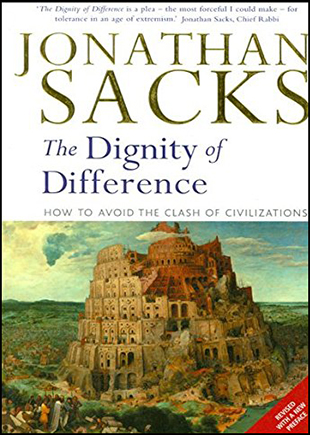"The question is: To what extent will we see our present interconnectedness as a threat or a challenge? As the work of man, or as a call from God to a greater humanity, as well as to a greater self-restraint? As for me, I believe that we are being summoned by God to see in the human other a trace of the divine Other. The test — so lamentably failed by the great powers of the twentieth century — is to see the divine presence in the face of a stranger; to heed the cry of those who are disempowered in this age of unprecedented powers; who are hungry and poor and ignorant and uneducated, whose human potential is being denied the chance to be expressed. That is the faith of Abraham and Sarah, from whom the great faiths, Judaism, Christianity and Islam, trace their spiritual or actual ancestry. That is the faith of one who, though he called himself but dust and ashes, asked of God himself, 'Shall the judge of all the earth not do justice?' We are not gods, but we are summoned by God — to do His work of love and justice and compassion and peace.
"Many years ago I had the privilege of meeting one of the great religious leaders of the Jewish world. He was the head of a large group of Jewish mystics. I was inspired by his teachings and impressed by the spirituality of his followers. But I had a question about the way of life he advocated. It seemed exclusive. In its intense and segregated piety it shut out the rest of the world. Was there not — I asked him — beauty and value outside the narrow walls in which he lived? He answered me with a parable.
"Imagine, he said, two people who spend their lives transporting stones. One carries bags of diamonds. The other hauls sacks of rocks. Each is now asked to take a consignment of rubies. Which of the two understands what he is now to carry? The man who is used to diamonds knows that stones can be precious, even those that are not diamonds. But the man who has carried only rocks thinks of stones as a mere burden. They have weight but not worth. Rubies are beyond his comprehension.
"So it is, he said, with faith. If we cherish our own, then we will understand the value of others. We may regard ours as a diamond and another faith as a ruby, but we know that both are precious stones. But if faith is a mere burden, not only will we not value ours, neither will we value the faith of someone else. We will see both as equally useless. True tolerance, he implied, comes not from the absence of faith but from its living presence. Understanding the particularity of what matters to us is the best way of coming to appreciate what matters to others.
"Difference does not diminish; it enlarges the sphere of human possibilities. Our last best hope is to recall the classic statement of John Donne and the more ancient story of Noah after the Flood and hear, in the midst of our hypermodernity, an old-new call to a global covenant of human responsibility and hope. Only when we realize the danger of wishing that everyone should be the same — the same faith on the one hand, the same McWorld on the other — will we prevent the clash of civilizations, born of the sense of threat and fear. We will learn to live with diversity once we understand the God-given, world-enhancing dignity of difference."
